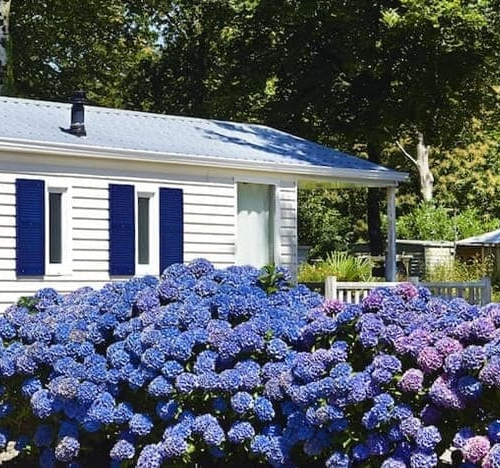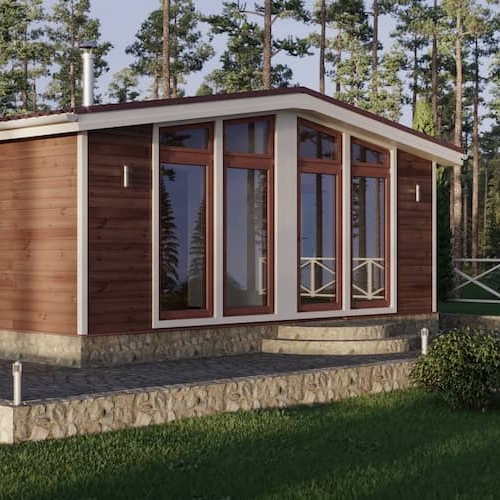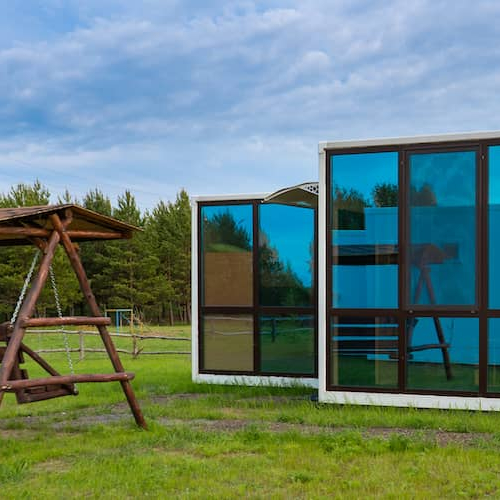Manufactured and mobile home loan financing
Contributed by Sarah Henseler
Feb 6, 2026
•5-minute read

As traditional home prices continue to rise, many borrowers are looking for more affordable paths to homeownership. Manufactured and mobile homes offer a budget-friendly alternative while still giving you a place to call your own.
And financing a manufactured home is more accessible than many people realize. For example, Rocket Mortgage offers conventional financing on qualifying manufactured homes. Understanding your options for mobile home loans and the requirements can help you find a mortgage that meets your needs.
Manufactured and mobile home loan requirements
Because manufactured homes have unique construction standards, lenders follow specific rules to ensure the home is safe and eligible for financing. The requirements listed below are what you’d need to qualify for a mobile or manufactured home loan with Rocket Mortgage.
| Requirement | |
|---|---|
| Credit score | Minimum qualifying FICO® Score of 620 or better |
| Debt-to-income ratio (DTI) | Should generally be 43% or below to qualify for most mortgage options |
| Title | Title must show that both the land and the home are tied together and converted to real property |
| Foundation | Home must be on a permanent foundation with towing hitch, wheels, and axles removed |
| Age of the home | Manufactured on or after June 15, 1976 |
| Number of units | Only single-unit properties |
In addition, you’ll need a minimum 5% down payment to purchase a manufactured home or complete a rate-and-term refinance. If you’re interested in taking cash out, you must leave at least 35% equity in the home, the property can’t be a single-wide home, and the maximum loan term is 20 years.
How to buy a mobile or manufactured home in 3 steps
Financing a mobile or manufactured home can be more challenging since many traditional lenders don’t offer these mortgages. Fortunately, following the right steps can increase your chances of qualifying for financing.
1. Check your credit score and DTI ratio
Your credit score plays a major role in whether you qualify for a manufactured home loan and the type of interest rate you receive. The higher your score, the easier it’ll be to get approved and receive favorable loan terms.
Start by checking your free annual credit report from Experian®, Equifax®, or TransUnion®. Look for any errors or outdated accounts and dispute incorrect information with the credit bureau. From there, you can focus on improving your credit by paying your bills on time and reducing your debt.
2. Save for a down payment
Buyers should save at least 5% of their home’s purchase price for a down payment. That means if you’re buying a $150,000 home, you’ll need a down payment of $7,500. Rocket Mortgage requires at least 5% down for manufactured homes, though a larger amount can help reduce your monthly payment and interest rate.
3. Prepare to apply for a mortgage
Now you’re ready to take the final step and apply for a mortgage through Rocket Mortgage. You’ll start the application by providing basic financial information, verifying your income and assets, and giving your approval for a credit check. From there, you’ll receive a Loan Estimate outlining your loan type, interest rate, monthly payments, and closing costs.
If you want to estimate your potential monthly payment or understand how different loan terms might affect your budget, try using the Rocket Mortgage calculator. It’s a helpful way to prepare before you apply.
How to finance a mobile or manufactured home
There are several financing options you can explore, and the right option depends on your credit score and down payment. Here are three different financing options you can consider.
Conventional loans
Rocket Mortgage offers conventional loans for qualifying manufactured homes. These loans give borrowers access to competitive interest rates and flexible loan terms. And there are two programs that may apply to certain home buyers: Freddie Mac’s CHOICEHome® program and Fannie Mae’s MH Advantage® program.
Both programs are designed for manufactured homes that look and perform more like site-built homes. These homes must meet specific property requirements, like having a permanent foundation, driveway, carport, or garage. These programs may offer more favorable terms than standard manufactured home loans, including lower interest rates or smaller down payments.
Federal Housing Administration (FHA) loans
FHA loans offer another pathway to finance a mobile or manufactured home, especially for borrowers with poor credit or who need a lower down payment. FHA Title I loans only finance the home, while FHA Title II loans finance the home and the land.
FHA loans have more flexible credit guidelines and allow for lower down payments than other financing options. However, not all lenders offer FHA loans for manufactured homes.
VA loans
Eligible active-duty service members, veterans, qualifying surviving spouses, and certain National Guard and Reserve members may be able to finance a manufactured home using a VA loan. VA loans don’t require a down payment or mortgage insurance as long as the home meets HUD and foundation requirements. This can make VA financing one of the most affordable options for qualifying home buyers.
FAQ about loans for manufactured and mobile homes
If you have additional questions about the safety standards and financing requirements, the following answers may help.
How are mobile homes and manufactured homes different?
Mobile homes refer to homes built before June 15, 1976, when federal construction and safety standards were not yet in place. Many of these older homes may not meet today’s HUD requirements.
Manufactured homes, on the other hand, are homes built after June 15, 1976, and must follow the HUD Code for construction, energy efficiency, and safety. These homes are not typically designed to be moved once installed on a permanent foundation.
Are modular homes the same as manufactured homes?
No, modular homes are factory-built like manufactured homes, but they follow local and state building codes rather than HUD standards. This means modular homes are treated more like traditional site-built homes.
Can you still get financing if you’re purchasing a single-wide home?
Yes, it’s possible to find financing for a single-wide home, but not all lenders offer it, and some may require specific property standards or loan types. If you’re buying a single-wide home, make sure to work with a lender familiar with manufactured housing requirements.
Do you need homeowners insurance to purchase a mobile or manufactured home?
Yes, most lenders require homeowners insurance to approve a mortgage since it protects both you and the lender by covering the structure in case of damage.
Can you finance a mobile home with 0% down?
VA loans may allow eligible borrowers to finance a manufactured home with no down payment, as long as the home meets VA and HUD property standards.
The bottom line: Apply for mobile home financing
Manufactured and mobile homes offer an affordable path to homeownership, and there are several loan options that can help you get there. Whether you’re exploring conventional, FHA, or VA financing, understanding the requirements can make the process easier. If you’re ready to take the next step, you can start the mortgage approval process today with Rocket Mortgage.
Rocket Mortgage is a trademark of Rocket Mortgage, LLC or its affiliates.
Rocket Mortgage is a VA-approved lender, not endorsed or sponsored by the Dept. of Veterans Affairs or any government agency.

Jamie Johnson
Jamie Johnson is a Kansas City-based freelance writer who writes about a variety of personal finance topics, including loans, building credit, and paying down debt. She currently writes for clients like the U.S. Chamber of Commerce, Business Insider, and Bankrate.
Related resources

7-minute read
Kit homes: What you should know before buying
Kit homes are mail-order homes delivered in parts and built right on your property. Explore the pros and cons of building one and how much it could cost you....
Read more

6-minute read
Modular vs. manufactured homes: What's the difference?
Modular and manufactured homes are both factory-built, but they have some key differences. Uncover the distinctions between modular and manufactured homes.
Read more

5-minute read
What is a prefab home?
Read more